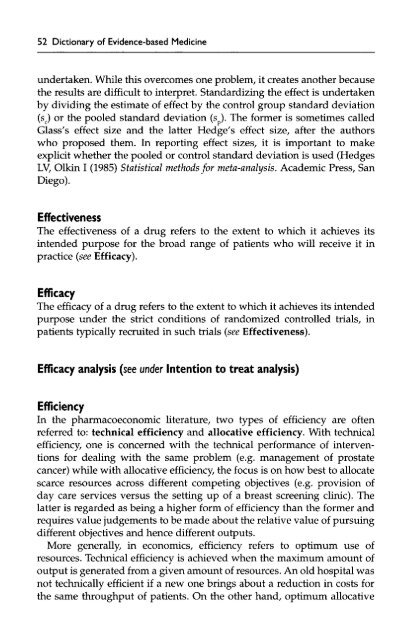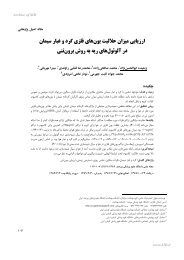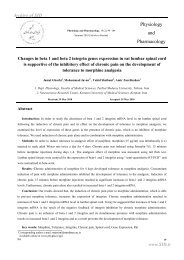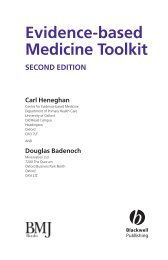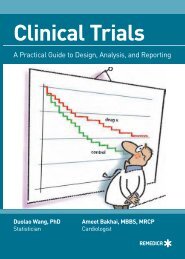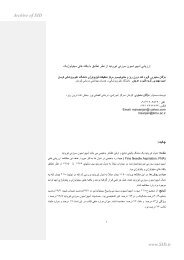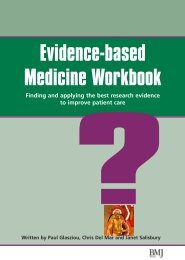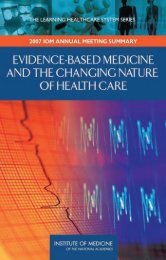Dictionary of Evidence-based Medicine.pdf
Dictionary of Evidence-based Medicine.pdf
Dictionary of Evidence-based Medicine.pdf
You also want an ePaper? Increase the reach of your titles
YUMPU automatically turns print PDFs into web optimized ePapers that Google loves.
52 <strong>Dictionary</strong> <strong>of</strong> <strong>Evidence</strong>-<strong>based</strong> <strong>Medicine</strong><br />
undertaken. While this overcomes one problem, it creates another because<br />
the results are difficult to interpret. Standardizing the effect is undertaken<br />
by dividing the estimate <strong>of</strong> effect by the control group standard deviation<br />
(s c ) or the pooled standard deviation (s p ). The former is sometimes called<br />
Glass's effect size and the latter Hedge's effect size, after the authors<br />
who proposed them. In reporting effect sizes, it is important to make<br />
explicit whether the pooled or control standard deviation is used (Hedges<br />
LV, Olkin I (1985) Statistical methods for meta-analysis. Academic Press, San<br />
Diego).<br />
Effectiveness<br />
The effectiveness <strong>of</strong> a drug refers to the extent to which it achieves its<br />
intended purpose for the broad range <strong>of</strong> patients who will receive it in<br />
practice (see Efficacy).<br />
Efficacy<br />
The efficacy <strong>of</strong> a drug refers to the extent to which it achieves its intended<br />
purpose under the strict conditions <strong>of</strong> randomized controlled trials, in<br />
patients typically recruited in such trials (see Effectiveness).<br />
Efficacy analysis (see under Intention to treat analysis)<br />
Efficiency<br />
In the pharmacoeconomic literature, two types <strong>of</strong> efficiency are <strong>of</strong>ten<br />
referred to: technical efficiency and allocative efficiency. With technical<br />
efficiency, one is concerned with the technical performance <strong>of</strong> interventions<br />
for dealing with the same problem (e.g. management <strong>of</strong> prostate<br />
cancer) while with allocative efficiency, the focus is on how best to allocate<br />
scarce resources across different competing objectives (e.g. provision <strong>of</strong><br />
day care services versus the setting up <strong>of</strong> a breast screening clinic). The<br />
latter is regarded as being a higher form <strong>of</strong> efficiency than the former and<br />
requires value judgements to be made about the relative value <strong>of</strong> pursuing<br />
different objectives and hence different outputs.<br />
More generally, in economics, efficiency refers to optimum use <strong>of</strong><br />
resources. Technical efficiency is achieved when the maximum amount <strong>of</strong><br />
output is generated from a given amount <strong>of</strong> resources. An old hospital was<br />
not technically efficient if a new one brings about a reduction in costs for<br />
the same throughput <strong>of</strong> patients. On the other hand, optimum allocative


